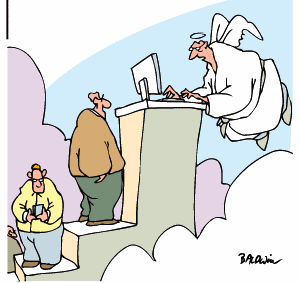
Career
Getting Brave With Albert Brooks
When making choices, sometimes it's best to choose the scariest thing
Posted October 31, 2012

When I reflect on my twenties from the vantage point of my late fifties, I realize that one big regret is over something I didn't do when I was young: moving to New York right out of college to try to get a job. What was I thinking? The question is much on my mind these days as I watch my daughter Samantha live the life of a young New York journalist – the one that I might have lived if I’d chosen differently. As I see her maneuver through staff jobs at a string of prestigious publications (including her current job at The New York Times Magazine, the Holy Grail of my own twenties), I find myself wondering: if I had made the choices in my twenties that Samantha has made in hers, would I now be looking back, in my fifties, on a glitzier career? Why didn’t I at least put my toe in the water of the vast sea of Manhattan publishing, the place I’d always wanted to end up anyway?
Trying to re-create that moment of decision-making, I’m forced to admit that maybe I was scared. Scared to find out that I couldn’t find the kind of job I wanted with only an English degree. Scared to live in Manhattan (and I was from New York), which was so crime-ridden in the 1970s that people wore their gold necklaces tucked inside their blouses for fear of having them ripped right off their necks. Scared to stop doing the one thing I already knew I was good at, which was being a student.
Fear – much like its close kin regret-avoidance – is a terrible organizing principle for decision-making. I learned this at the movies. In the film “Defending Your Life,” the character played by Albert Brooks, Daniel Miller, has been killed in a car crash, and now he’s stuck in an afterlife limbo (which looks hilariously like a golf community in Florida) so he can be evaluated before he’s allowed to move on. A panel of judges views representative video clips from Daniel’s time on earth, moments when he had a decision to make. At each of these important moments, he could have gone with either the courageous or the cowardly choice.
Again and again, Daniel made the safer decision -- whether to invest in Casio (he opted instead for investing in cattle), whether to negotiate for a higher salary (he just took what they offered—but did get them to throw in a parking space), whether to marry the girl he loved (at least that one—spoiler!—he managed to get right in purgatory). He did make one intemperate choice, to buy himself a sports car for his 40th birthday – but that was the one that killed him, literally.
Like any good movie, this one made me reflect on my own life – and I wondered whether my own choices, too, had been the cowardly rather than the courageous ones. Is that really the secret to happiness, jumping in with both feet, taking the dangerous plunge without knowing how – or even whether – you’ll come out the other end? I could have made the risky choice early in my career – move to New York and either sink or swim – but I didn’t.
Lots of things constrain the choices we make, in our twenties and at every other age. It might be fear that keeps us from making the best – or at least the bravest – decisions; it might be an earnest but misguided attempt to avoid eventual regret. We might find ourselves buckling under information overload, swamped by decision fatigue, undone by our attempt to make the best of all possible decisions. But as difficult as it is, especially for a young person just starting out, decisions must be made – decisions about where and whether to go to school, what career to pursue, whether and when to marry or have a child. That's what makes the twenties such an exciting yet terrifying time of life.

